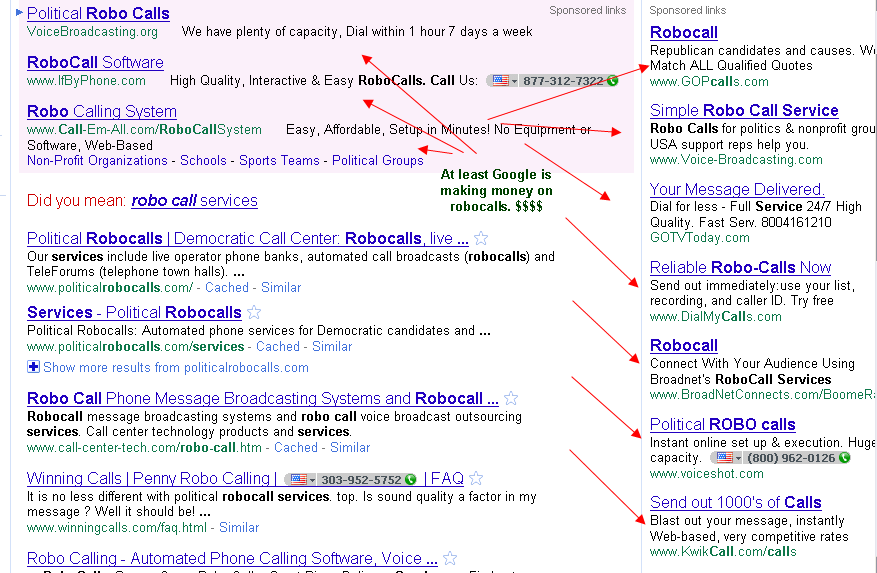The ROI of robocalls and why the bots keep calling

It's almost noon and I've received four political robocalls an hour since working hours began. Why do the robots call? There appears to be a return on investment there.
Don't laugh. You must be thinking: "What moron would vote based on a robo call?" It's not about the vote rate as much as it is reaching some fool that will listen.
Pew Research in 2008 did some robocall research. It found that 81 percent of likely caucus voters in Iowa received a pre-recorded campaign call from your friendly neighborhood robot. In New Hampshire, 68 percent of likely voters in 2008 got a robocall. In Iowa, 44 percent of folks hung up. In New Hampshire, 46 percent usually hung up.
However, 35 percent of Iowa likely voters in 2008 usually listened. In New Hampshire, 19 percent usually listened.
A more recent survey had similar findings. In other words, robocalling is a lot like spam. You cast a wide net and if you hook a few dummies you have a solid return on your investment.
While academics may think those hit rates stink, they actually are pretty good. Why? Robocalls cost near nothing.
Do a Google on robocall services and you get a screen like this:

But if you actually click on these sponsored links you see why robocalls are the plague that keeps giving. Let's take the pricing of VoiceShot, which provides you with a do it yourself online call center. VoiceShot will charge you 12 cents for a successful call.
What's a successful call? A successful call is any fool that stays on the line for 60 seconds. So let's say you do 1 million robocalls. Of those calls, 300,000 jokers listen in for a minute. You just reached 300,000 for $36,000. Why wouldn't you do robocalls?
And VoiceShot isn't even the cheapest robocall service.
A company called Homeytel will do robocalls for you at less than a penny a call. Hell, anyone could do a robocall at those rates just to gripe about robocalls. Homeytel's pitch goes like this:
WHAT DO DEMOCRATS, REPUBLICANS, LIBERTARIANS, AND THE TEA PARTY HAVE IN COMMON? They all use HomeyTel voice broadcasting. Why? Because we offer the very best service plus you can exactly budget your campaigns. We have found that a 15-30 second message is more effective than a 60 second message, if the message is clear and timely. Short messages simply deliver more bang for the buck and if your voter list is clean you will realize substantial savings over a per minute usage charge. Most voter lists reach 70-90%.
NEW LOWER RATES! Due to higher usage we have been able to negotiate lower rates and we are passing the savings onto our customers. Thank you loyal customers!
OUR MOST POPULAR PACKAGE NOW LOWER THAN EVER! 100,000 calls live and answering machine, 30-second message, 3 attempts, and up to 3 free campaigns for $1,695.00. (Add $25.00 setup for each campaign over three. Add 10% for each 3 second increment over 30 seconds.)
Add it up and it's obvious why robocalls keep happening. It's cheap. And you may just be successful. Now this robocall ROI equation may change if all you have is a cell phone, but for now the low costs add up for pols.